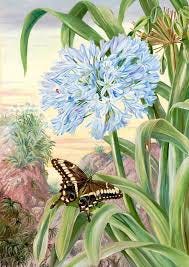A talent for observation
In this passage from Marianne North's The Vision of Eden (1893), the artist encounters a party of English picnickers escaping the rain. Two very different attitudes to India emerge
Darjeeling, North India:
It was late in the morning before we got started, and ascended the steep hill through the camp. Much of our way led through the forest. At one place a great fallen tree filled up the path, covered with rhododendrons and other parasites, and I saw my old friend the aralia again. Rangerom is a mere clearing in the forest on the steep hillside, which some insane governor had once made to grow cinchona in. It was then turned into a Botanic garden of native plants and pines, and a poor Scotch gardener was slowly dwindling away with fever and ague among them.
While hard at work at that fairy fell I felt it was raining, and before I could get over the fifty yards of steep descent to the bungalow with my things, I was soaked through, and came back through a running stream of water to find the house occupied by a large picnic-party - a regular ball-supper, cooks, and other litter all over the passage floor, and half a dozen ladies all drying their things and themselves in my room, using my towel and soap, almost too much company to be pleasant. I escaped as soon as I could to my poor soaked painting.
“You only sketch it on the spot and paint it indoors?“ one beauty said, pointing to the poor thing which was so covered with raindrops that it looked as if it had the smallpox. “Yes“ I said, “that’s what I do. Then I take it out to be rained on, which makes the colours run faster, and that’s why I paint, as you say, so quickly.“
Those unthinking, croqueting-badminton young ladies always aggravated me, and I could hardly be civil to them. I had not met a single person at Darjeeling who had seen the great mountain at sunrise, and few of them had seen it all that year. Kinchinjanga did not keep fashionable hours.
What we love about this passage…
Our guest curator this week is Josephine Ormond. She suggested this extract, and she told us why:
This passage gives me a perfect feeling of the author’s focus and passion and, pitching her impressions against the fellow English population of ex-pats she came across, gives me an instant sense of India under English colonial rule at that time.
North was much more at home with plants than she was with the average human being. India was only one of the many places where she studied botany. She had such an astonishing life.
About the Author
Marianne North (1830-90) was born in Hastings, England. She first studied voice, but her voice failed so she turned to art and biology. She became a prolific botanical artist, well known for her hundreds of paintings of landscapes and plants. She travelled widely and is also known for her writings and her plant discoveries. There is a gallery named after her at the Royal Botanic Gardens at Kew.
To Read Alongside…
Tennessee Williams’s play The Night of the Iguana contains a scene of similarly jarring intrusion, when a bus full of noisy female tourists arrives unexpectedly at a remote hotel in a lush Mexican jungle, their liveliness contrasting the shy demeanor of an artist named Hannah, who sketches people for a living. Like North’s excerpt, the play shows us how differently people respond to an unfamiliar environment; in both, the artist figure feels completely at home, and appreciates the natural beauty that seems to escape the notice of the others. Maybe this has something to do with the fact that the artist in both pieces is alone, a solo traveller, whereas the others are in groups—their gaze turned toward each other rather than outward at what’s around them.
Talk of exotic hotels and artwork also reminds us of a scene in Elif Batuman’s hilarious novel The Idiot (2017) where the narrator is haunted by a memory of her and her mother becoming trapped in a ‘pink-tiled courtyard of a strange hotel’ in Mexico. The memory becomes inspiration for an art project on ‘Constructed Worlds.’
Curator’s Corner
Josephine Ormond is a retired laboratory technician. She lives east of Southampton, Hampshire. Jo writes: ‘Having spent career working as a Laboratory Technician in Medicine and Food Science, I am enjoying the rich choice of authors available from local libraries and Book Clubs.’
Suggest a LitHit!
Tell us your own favourites from literature you've read, and we can feature you as a Guest Curator. Just email us with the following information:
Your full name
The title of the book you're suggesting
The location of the excerpt within the book (e.g., "in the middle of chapter 5"), or the excerpt itself copied into the email or attached to it (in Word)
Why you love it, in just a few sentences
About LitHits
LitHits is a project of the Faculty of English at the University of Oxford. It helps you make time for reading by bringing you unabridged excerpts from brilliant literature that you can read on the go, anytime or any place. Our curators carefully select and frame each excerpt so that you can dive right in. We are more than a book recommendation site: we connect you with a powerful, enduring piece of literature, served directly to your mobile phone, tablet or computer.
You might also enjoy...
Feedback
We'd love to hear your thoughts on our newsletter:
kshepherdb@yahoo.co.uk
Graphic design by Sara Azmy
All curation content © 2023 LitHits. All rights reserved.




